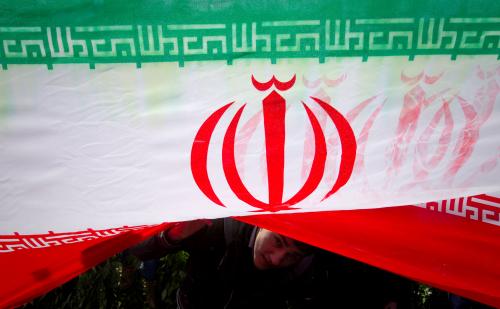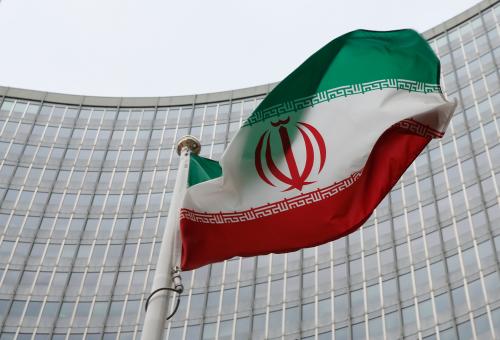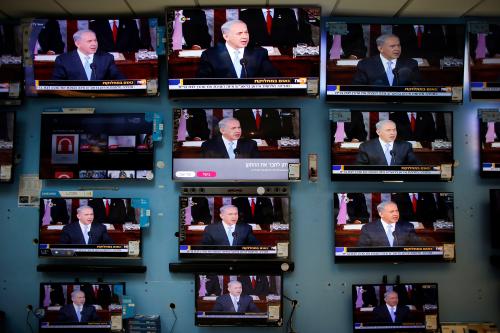On the eve of the first anniversary of the Iran nuclear deal, Tehran has announced that Iranian-American Siamak Namazi (who has been detained since last October) and three other dual nationals have been charged with unstated crimes. Tehran’s acknowledgement of the charges—and the Obama administration’s anemic response to these arrests to date—underscore that managing tensions in the post nuclear-deal era remains complex, both for Washington and Tehran.
Siamak’s story
Last week, in a welcome but unavoidably symbolic gesture, Rep. Ed Royce (R-CA), chairman of the House Foreign Affairs Committee, and Rep. Gerry Connolly (D-VA) introduced a bipartisan resolution demanding that Tehran release Siamak, as well as his father Baqer. Siamak is a forty-something consultant who spent his formative years in the United States; his father, Baqer, served as a provincial governor under Iran’s monarchy and as a UNICEF official during his post-revolutionary exile. Outside their day jobs, both men long campaigned for greater engagement between Washington and Tehran. Like many in the Iranian diaspora, they returned to Iran whenever country’s shifting political winds seemed hospitable.
It is a particularly cruel irony—and grotesquely consistent with the tactics of the Islamic Republic—that the diplomatic breakthrough that both Namazis hoped for precipitated their current nightmare. On the heels of the nuclear deal, Iranian security forces prevented Siamak from leaving the country; he was interrogated for months before he was brought to Iran’s infamous Evin Prison in October 2015. Then in February, Baqer was lured back to Iran on the false premise of visiting his jailed son; instead, he was arrested upon his arrival at the Tehran airport.
Unfortunately, their plight is not unique. Even after Tehran’s much-heralded release of five imprisoned Americans, including Washington Post reporter Jason Rezaian, in January, Tehran has arrested several other dual nationals on trumped-up charges. This includes Nizar Zakka, a Lebanese technology expert who holds a U.S. green card; Homa Hoodfar, a Canadian-Iranian academic; and Nazanin Ratcliff, a British-Iranian woman who was seized at the airport with her toddler daughter. They follow in the painful footsteps of many other dual nationals and countless Iranians arrested without cause.
Paranoia blues
You probably haven’t heard much about Siamak, Nizar, Nazanin, or Homa in the press. Some have deliberately avoided the spotlight, traumatized by their experience or hoping that an “inside strategy” to exert pressure within the system will generate results. It’s not hard; in the post-nuclear deal era, Iran’s abuses are overshadowed by ISIS atrocities, Brexit anxieties, and an unusually absurd American presidential campaign.
But Tehran’s targeting of Americans and others with foreign ties is a pattern that warrants public and policymakers’ attention, because it exposes the nature of Iran’s ruling system and the landscape for American influence in post-nuclear deal Iran. It may be tempting to dismiss these arrests on the grounds of bad luck or individual foolishness or the vagaries of Iran’s enduring power struggle. But none of those rationalizations—while perfectly plausible—does justice to the scope of the problem.
[T]hese arrests are purely political, the inevitable byproduct of a ruling system that is steeped in a culture of paranoia, particularly toward the West.
In fact, these arrests are purely political, the inevitable byproduct of a ruling system that is steeped in a culture of paranoia, particularly toward the West. As Iran’s leaders reopened to the world via the resolution of the nuclear impasse, they have instinctively sought to reinforce the ideological antipathies on which they built the post-revolutionary state. After all, flexing the muscles of theocratic authoritarianism offers a convenient way to persuade a population that is eager for change to steer clear of the temptations of globalization and “Westoxication.” Tehran’s deep-seated fears of a Western-orchestrated conspiracy to undermine the regime are echoed elsewhere; Egypt, China, and Russia have similarly clamped down on international organizations, with Americans and other foreign nationals caught in the crossfire.
For the Islamic Republic, seizing U.S. citizens is also a well-honed tactic for aggravating its foremost adversary in Washington. From the 1979 hostage crisis through the detention of U.S. sailors earlier this year, Iran’s insecure leadership appreciates the efficacy of using individual Americans as pawns in stoking bilateral tensions. It’s a maneuver that conveniently highlights the limits on Washington’s capacity to protect its own nationals abroad. As I wrote at the time of Rezaian’s arrest nearly two years ago:
“When an Iranian-American is seized by the system, the world’s sole superpower is forced to fall back on the least satisfying instruments of diplomatic influence: eloquent statements from the podium, third-party consular inquiries, and quiet efforts through cooperative interlocutors.”
The Congressional resolution appealing for the Namazis’ release represents an additional step in the right direction, but it also demonstrates the weakness of U.S. leverage in the wake of the nuclear deal. At the family’s behest, the resolution does not propose specific penalties that might; Siamak himself was a fierce critic of Washington’s use of sanctions as an instrument for influencing Iran policies. Unfortunately, that deference was probably unnecessary, as the Obama administration is particularly loathe to deploy new economic pressure against Tehran in these early days of the accord’s implementation.
Shot in the foot
So these arrests go essentially unanswered, and the ripple effects deter Americans and Europeans from engaging in precisely the places and on precisely the issues where their contributions are most valuable. And when Washington appears unable to protect its own citizens from the long arm of Iranian repression, American advocacy on broader human rights issues carries even less credibility with Tehran. Given the proliferation of these cases around the world—launched by authoritarian regimes that fear a democratic contagion—Washington needs to devise an across-the-board strategy to counter intensifying efforts to target Western individuals and institutions. Imposing sanctions for each individual case would not be realistic or effective, but Washington should be prepared to deploy a clear, predictable and escalating set of responses for governments that routinely use American citizens as pawns for their authoritarian agendas.
For Tehran, dual nationals may seem like easy pickings, but ultimately these arrests—and the broad campaign of repression that has continued almost without interruption since the 1979 revolution—pose profound challenges for Iranian interests. After all, its far-flung, disproportionately well-educated, and wealthy diaspora could furnish Iran with a vast pool of talent and capital for its future development. But how many Iranian expatriates will trust their investments—and their personal freedom—to a system that baits 80 year old men into imprisonment and cleaves mothers from their young daughters (and then confiscates the baby’s British passport)? How can any foreign investor rely on official assurances and legal protections from a government that arrests individuals arbitrarily on the basis of wild-eyed conspiracy theories?
[U]ltimately these arrests…pose profound challenges for Iranian interests.
The risks should not be underestimated, and their repercussions will in time hit Iran hardest. This latest round of repression strikes at the very heart of what the nuclear deal was intended to accomplish—Iran’s rehabilitation from pariah status and its full reintegration into the global economy. Iranian leaders seem impervious to the one of the key lessons from their previous efforts to reopen the economy to the world: that provocative policies will undercut access to finance and the inclination of international investors.
Fundamentally, as I commented in January, after the Saudi embassy in Tehran was torched:
“the requirements of any kind of resilient reentry to the global economy and achieving the stature that Iranians crave are simply incompatible with aspects of Iran’s official ideology. A state that refuses to rein in—or, more accurately, still relies on—semi-official vandalism will inevitably find its ambitions curbed instead…to fully come in from the cold, Tehran will have to disavow the revolution’s ideological imperatives.”
For an Iranian leadership that has complained incessantly about the slow pace of sanctions relief, there is an unabashed hypocrisy in this kind of self-sabotage, whose implications extend well beyond the economy. The arrests of dual nationals represent the tip of an iceberg of injustice that underpins—and will eventually undermine—the Islamic Republic. The stalwarts of the Iranian system have constructed an elaborate ideological and bureaucratic edifice aimed at preserving their own power. In the end, their disdain for rule of law and their phobias about Western influence represent greater vulnerabilities than any of the perceived threats that motivate the crackdown.
The Brookings Institution is committed to quality, independence, and impact.
We are supported by a diverse array of funders. In line with our values and policies, each Brookings publication represents the sole views of its author(s).








Commentary
Iran’s arbitrary arrests hurt it more than “Westoxication” ever could
July 12, 2016